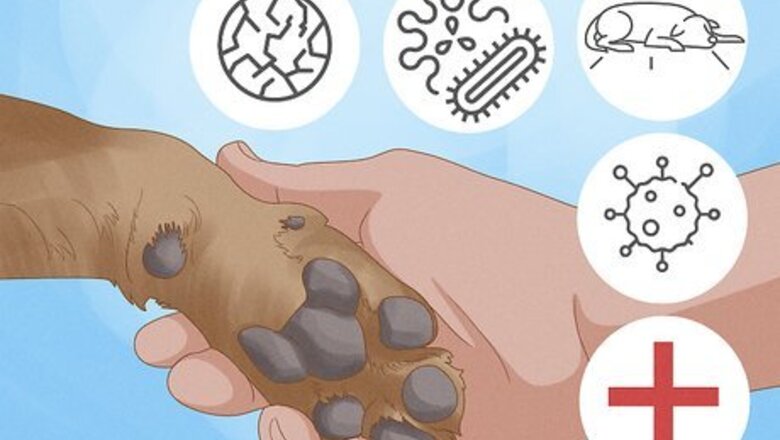
views
- Soothe your dog’s itchy, inflamed skin with an oatmeal or chamomile bath.
- Try changing your dog’s shampoo or food to determine if they’re allergic to an ingredient.
- Make your dog wear booties to protect their paws from injuries and prevent them from licking.
Examine your dog’s paws to see why they’re licking.
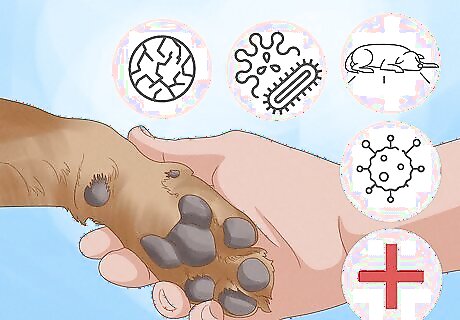
Determine if there is a noticeable cause for your dog’s licking. There are a number of reasons why your dog might be interested in their paws, and knowing the cause can help you choose the best home remedy. Check your dog’s paws and monitor their behavior to see if any of these could be the cause: Dry skin can cause your dog to itch all over. Check your dog for dandruff and see if their paws are cracked and dry. Airborne and food allergies can make your dog lick or chew their paws, as the skin becomes inflamed and itchy. Infections are more common than you’d think in dog’s paws. Your dog’s paws may be infected if they are swollen and discolored. Injuries like cuts and bruises can cause your dog to lick their paws in an attempt to soothe the pain. Check the pads of their paws for any unusual scrapes or discoloration. Boredom is often the leading cause of dogs licking their paws. This could be an OCD-like tendency in your dog that can be treated with a new puzzle toy or bone.
Check the pads of your dog’s paws for cuts.
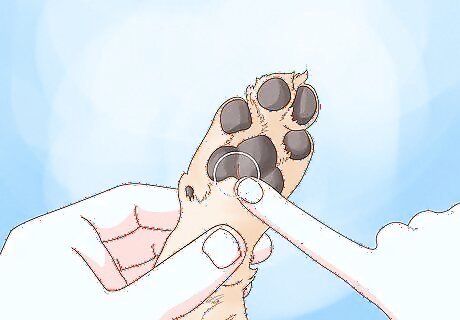
Spread your dog’s toes to look for hidden cuts. Small scrapes could be hiding under your dog’s paws. Before trying any home remedy, do a thorough check to make sure they don’t have any cuts. Carefully inspect every part of your dog’s paws, including the sides of their paw pads. Do not start a home remedy if your dog has a deep cut or tenderness in the area as they may need to see a vet. Notice if there’s any discoloration or swelling around their paw pads, and remove any debris like pebbles or dirt. Your dog pulling away or whimpering when you inspect their paws could be a sign of tenderness. Visit a vet if your dog has a deep wound, cut, or tenderness. It’s best to make sure the cut is not infected. Clean your dog’s injury with cold water and anti-bacterial soap, then wrap the paw to protect it from further injury or infection.
Soak your dog’s paws in apple cider vinegar.
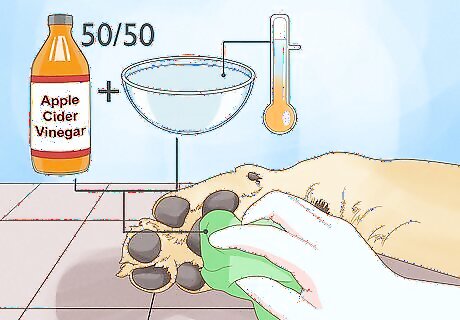
Use apple cider vinegar as an anti-bacterial or anti-fungal treatment. Your dog may stop licking their paws after just one taste of this powerful treatment. Applying an apple cider vinegar solution to your dog’s paws can be a temporary fix while you get to the root of the problem. Massage a 50/50 mix of apple cider vinegar and warm water into your dog’s paws. Triple check to make sure your dog doesn’t have any open sores on their paws before applying the solution, as it can be extremely painful and cause symptoms to worsen. Alternatively, spray your dog’s paws with the solution if you can’t soak them.
Give your dog an oatmeal bath.
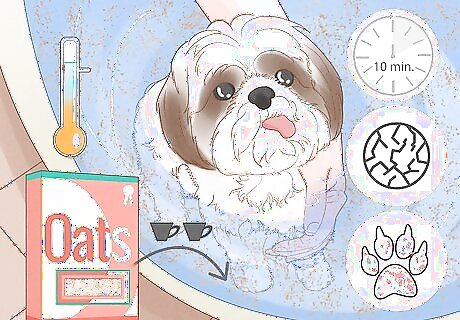
Soothe itchy, rashy skin with a natural anti-inflammatory. Oatmeal baths are a great way to help heal dry, cracked skin, and your dog can even get a treat out of it! To make an oatmeal bath, simply mix 2 cups (470 mL) of oatmeal in a warm bucket of water, and soak your furry friend’s paws in it for about 10 minutes. You may not be able to see results immediately, but their licking should lessen after a few soaks. Oatmeal is safe for dogs to eat in small amounts, so let your pup have a few licks of their bath—especially if it helps them stay still!
Spray coconut oil on your dog.
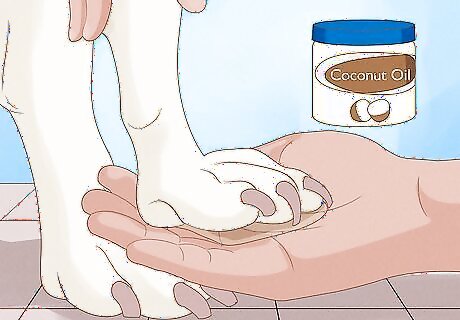
Massage coconut oil into your dog’s paws to moisturize them. Coconut oil is a natural way to soothe and moisturize dry paws and skin. Your dog will probably enjoy the massage, especially if the coconut oil has been chilled. You can also put a few drops of it in their food to promote a healthy coat. Coconut oil is safe for dogs to ingest, so you don’t have to worry if they lick their paws after you apply it. Make sure you give your dog high-quality oil with extra virgin and organic formulas, especially if you’re putting it in their food. Coconut oil is also used as a treatment for fleas.
Soak your dog’s paws in baking soda.
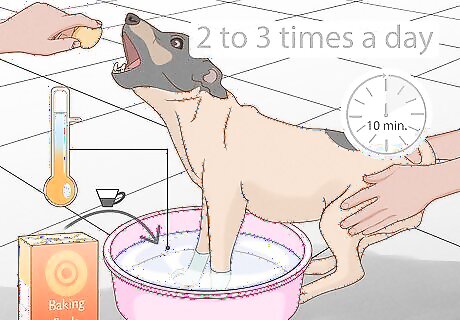
Reduce inflammation and licking with baking soda. Baking soda is a natural anti-inflammatory and acidic neutralizer that can help ease your dog’s irritated skin. Put ⁄2 cup (120 mL) of baking soda in a bucket of warm water and soak your dog’s paws for 10 minutes. Repeat this 2 to 3 times a day for the best results. Use treats to keep your dog busy and still for 10 minutes. If you have a larger or rather hyper dog, try soaking their paws in a bathtub, doubling the baking soda mix if necessary.
Give your dog a chamomile bath.
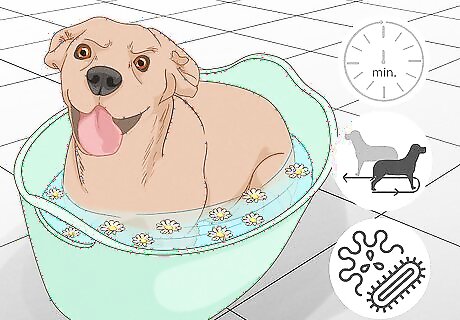
Calm anxiety and infection with a soothing bath. Chamomile is an herbal remedy with antibacterial and antioxidant properties, making it perfect for fighting off infections. Not only does it help soothe your dog’s skin, but the smell can also calm their nerves. Mix chamomile in warm water and soak your dog’s paws for a few minutes. If you don’t have chamomile, no worries! Pick up some chamomile tea bags at the store and put the steeped bags on your furry friend’s paws.
Think of changing your dog’s diet.
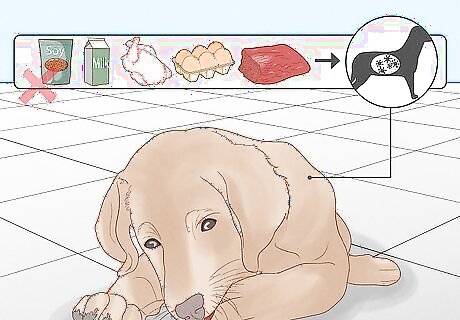
Your dog might be allergic to something in their food. Your dog’s immune system may be going haywire if they ate something they’re allergic to. If their licking also comes with frequent diarrhea, reassessing their diet may be the solution. Wheat, soy, eggs, dairy, beef, chicken, and fish are all common allergens in dogs. Switch your dog to a simple, homemade diet that avoids common allergens to see if that helps. Talk to your vet to see the best course of action for you and your dog moving forward. They may be able to recommend a new dog food to try.
Try a different dog shampoo.
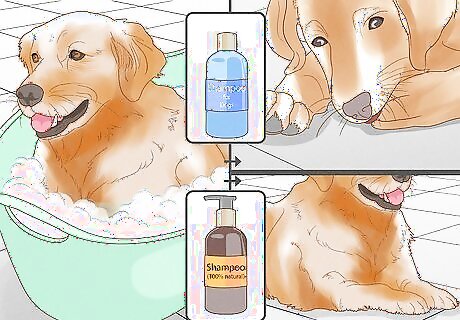
Notice if the licking worsens after a bath. Your dog’s licking could be from a sensitivity to a grooming product. If a licking fit starts right after you bathe them, try switching up the products you use. Most dog products are gentle, but each dog is different. If the licking doesn’t stop after you switch, the shampoo probably isn’t the cause. Try switching to a dog shampoo that is 100% natural with moisturizing ingredients.
Buy your dog a pair of dog booties.
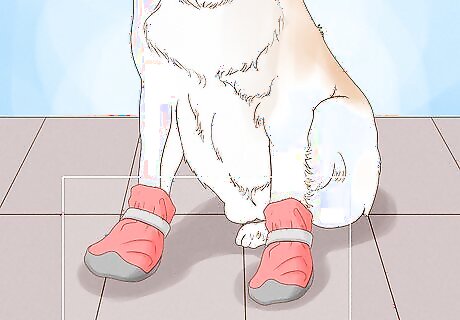
Put booties on your dog’s paws to protect them from injuries. Dog shoes are an easy way to protect your furry friend’s feet from the elements and any sharp objects that may cut them. Not only do these stylish booties prevent injuries that may lead to excessive licking, but they also prevent the licking itself. It may take some time for your dog to adjust to the booties, so be patient and give them plenty of rewards.
Apply a paw balm to your dog’s paws.
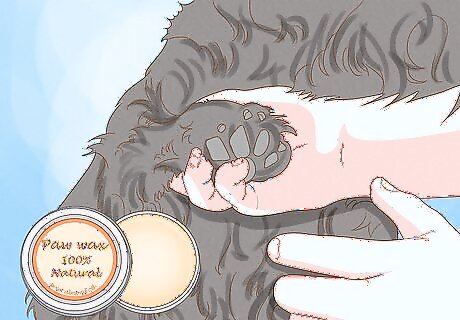
Create a protective barrier with a balm or wax. A slather of lotion can be a quick fix for cracked skin. Like us, dogs' skin can crinkle and crack when the weather changes. Your dog’s paw pads are delicate, and running between hot, cold, and rough surfaces can irritate the skin. Apply a paw balm or paw wax to moisturize your furry friend’s skin and protect it from further damage. Pick a balm or wax that is 100% natural and won’t harm your dog if they do lick it. Balms made of coconut oil, sunflower oil, sweet almond oil, jojoba oil, Vitamin E oil, and cocoa butter are great choices.
Visit a veterinarian if your dog continues to lick their paws.
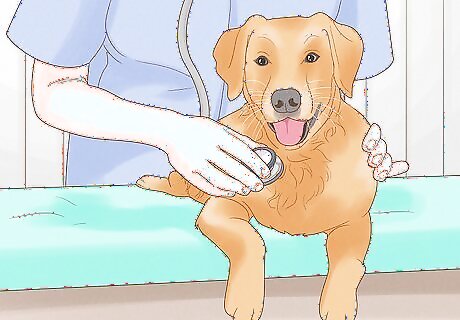
There may be an underlying issue only a vet can solve. If your furry friend continues to lick their paws no matter what you do, don’t panic. Schedule a visit with your vet to get your pup checked out. They’ll be jumping around on those paws again in no time!
















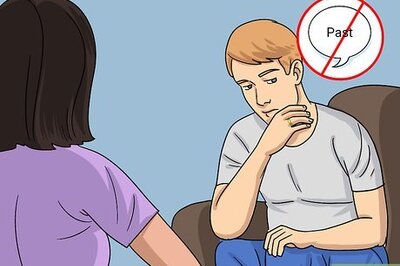
Comments
0 comment